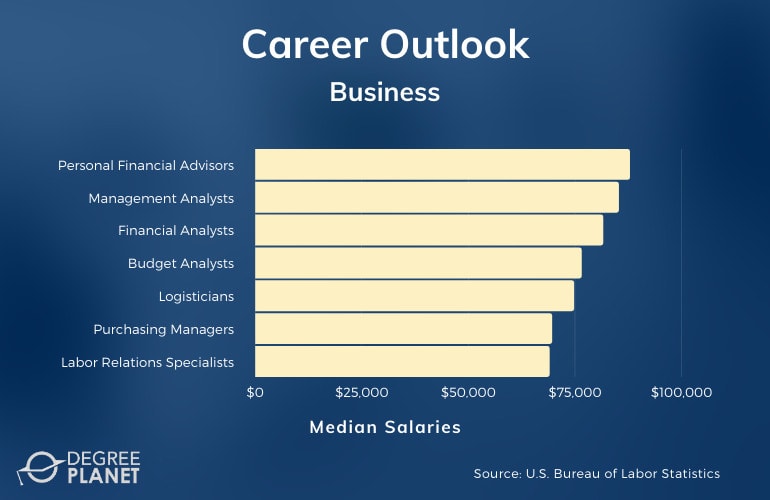Is a business degree worth it? If you want a degree that can amplify your skill set, make you an attractive choice for employers, and leave you with a multitude of career options (in marketing, finance, event planning, human resources, and hospitality, to name a few), then yes, a business degree may be worth it.

Pursuing a college degree requires a great deal of effort, focus, and perseverance, so before making an investment into a program, you may want to seriously consider your own goals and aspirations, and research job prospects for your chosen field.
Editorial Listing ShortCode:
If you think an on-campus or online degree in business may be the right choice for you, then read on to learn more about this highly valued qualification.
Is a Business Degree Worth It?

Yes, a business degree is worth it for many students. The Bureau of Labor Statistics is projecting 5% job growth in business and financial occupations over the next 10 years.
Common business and finance careers in this field include:
- Market research analyst
- Purchasing manager/buyer
- Financial analyst
- Budget analyst
- Cost estimator
Companies rely on employees who communicate effectively, make smart budgetary decisions, and think strategically about marketing initiatives.
Editorial Listing ShortCode:
These are the kinds of skills a business program can help you develop. They are often valued by a wide range of organizations, from charities to Fortune 500 companies. A regular business degree or even an MBA is worth it for many students because they can help open doors to a multitude of different careers.
How to Decide Whether a Business Degree is Right for You

Just as the skills taught in a business degree program are valued in so many different fields, a business degree program may be a great choice for people with a wide variety of skills, abilities, and goals.
A business degree may be the right choice for many people, especially those who can relate to the following.
1. You like to work with numbers.
If numbers are your thing, then a business degree may be a great option for you.
In addition to the courses typically offered in a business school, you may thrive in the financial environment that many graduates with a business degree pursue.
2. You like to work with people.

Careers in business are not all numbers. Human resources, event planning, financial planning, and even purchasing may require you to use your emotional intelligence to be successful. So, if you are a “people person,” a business degree may be the perfect choice for you.
Not only may your business degree require you to work with your fellow students, it may also challenge you to think about people’s needs in the business field.
3. You want a practical degree with a wide range of career options.
A business degree program can help you develop skills that will be directly applicable to your career in business. Learning about topics such as marketing, finance, and management can help prepare you to be successful in your career.
This degree option typically offers a broad look at the field, so you can better assess which career choice will fulfill your goals and be conducive to your abilities.
5 Things You Can Do with a Business Degree

There are many careers well suited to someone with a business degree, so you will need to examine your own goals and aspirations to embark on your career path.
Here are five examples from the Bureau of Labor Statistics of careers that those with a business degree could pursue.
1. Personal Financial Advisor
Personal financial advisors counsel their clients on financial planning. They may advise individuals on loans and mortgages, college savings, emergency funds, investments, and retirement planning.
These professionals need to be highly knowledgeable about personal finance (including tax laws and investment strategies) in order to ensure positive results for their clients.
2. Meeting, Convention, and Event Planners

Event planners organize all aspects of events, requiring a high level of social skills, energy, and professionalism.
Event planners may run their own business (offering event planning services for weddings, parties, or professional events), or work for an organization (serving as event coordinators for that organization’s professional events).
Editorial Listing ShortCode:
Finally, an event planner may work for a hotel or convention center to promote their event spaces to clients and provide event coordination.
3. Market Research Analyst

Market research analysts determine how successful products or services will be in the market. By gathering and analyzing data, they acquire meaningful and actionable information so their company can make smart business moves to benefit their bottom line and fulfill the needs of their customers.
Market research analysts typically use statistical software to analyze sales trends, evaluate the success of marketing strategies, and transform large amounts of data into practical reports to inform future business decisions.
4. Purchasing Managers, Buyers, and Purchasing Agents
Procurement professionals coordinate the purchasing of goods or services for their organization. They work with suppliers and vendors to ensure that their company purchases the best products and services to fulfill their needs at a price that meets their budget.
Purchasing buyers, managers, and agents must be skilled at conducting research, negotiating contracts, and analyzing financial reports.
5. Human Resources Specialist

Human resources specialists work to fill the employment needs of their company. This role typically requires a high degree of professionalism, conflict management skills, and knowledge of the company’s policies and procedures.
Hiring specialists may recruit, screen, and hire applicants for employment. Human resources specialists may also conduct work on payroll and benefits administration, and coordinate employee training programs.
A business degree can help open doors to exciting and fulfilling careers. But if you want a more specialized degree, there are many other options available as well.
Business Degree Alternatives

Many business degree programs offer “concentrations” (such as marketing, finance, and accounting), which can allow you to focus your studies on your specialty within the business world. But with colleges and universities offering so many options in majors, it’s important to consider the alternatives.
As you think about your goals, consider these options that are closely related to the business degree but have their own unique merits:
- Bachelor’s in Hospitality: If you envision yourself as a manager in the service industry (or want to take your existing career in this industry to the next level), then a degree in hospitality may be a great option for you. This degree helps prepare graduates for leadership roles in hotels and resorts, restaurants, casinos, or even assisted living organizations. A great hospitality program may give you experience within the industry through internships, so you can hit the ground running after graduation.
- Bachelor’s in Public Administration: Public administration programs emphasize the development and execution of policies that affect communities as a whole (inclusive of citizens, community services, and businesses). This degree might lead to leadership roles within the public sector (including government, social and community services, or law enforcement) or with nonprofit organizations (such as foundations or charities).
- Bachelor’s in Human Resource Management: Most companies, except the smallest of businesses, have a need for human resource professionals who not only understand the importance of the people in an organization, but also create and improve organizational structures that accomplish company goals. If you see yourself working in human resources (hiring employees, creating training programs, and resolving personnel conflicts), then a degree in human resource management is an option worthy of consideration.
Whether you see yourself as a fundraiser, accountant, government administrator, or marketing executive, there is a degree out there to help you obtain the credentials and education you need to succeed.
Editorial Listing ShortCode:
It’s also important to recognize that these degrees are often a jumping off point for your career and typically don’t lock you into one position or field. Education opens doors, and your career will have its own unique journey.
Business Careers & Salaries

According to the Bureau of Labor Statistics, there are a wide range of careers in the business and financial fields. A bachelor’s degree is typically required for these occupations, however some of these occupations you can do with an associates degree in business. Either way, a business degree will give you credentials and skills to help you pursue these careers.
| Careers | Annual Median Salaries |
| Personal Financial Advisors | $89,330 |
| Management Analysts | $87,660 |
| Financial Analysts | $83,660 |
| Budget Analysts | $78,970 |
| Logisticians | $76,270 |
| Labor Relations Specialists | $73,240 |
| Purchasing Managers, Buyers, and Purchasing Agents | $72,270 |
| Market Research Analysts | $65,810 |
| Fundraisers | $59,610 |
| Meeting, Convention, and Event Planners | $51,560 |
Because businesses have so many working parts, there are many directions in which you can take a business career. From leading your company’s purchasing activities, to planning events, to negotiating collective bargaining agreements, there are careers to suit a range of interests and aptitudes.
Is a Business Degree Useless?

A business degree is a practical and versatile option that is far from useless. Any bachelor’s degree may increase your earning potential, but if you want to pursue a career in any business-related industry, a bachelor’s degree in business can help propel you toward your goals.
A business program offers instruction about management principles, marketing techniques, economics, communication, organizational structures, and accounting. These skills are usually attractive to employers, and may improve you as an individual and help you hone your own entrepreneurial spirit.
Getting Your Business Degree Online

If you want to pursue a business degree, but need a more convenient option than attending classes in person, know that there are many accredited colleges and universities that offer business programs completely online.
Be sure to research whether your chosen university is accredited by a regional accrediting organization. Accreditation often serves as a “stamp of approval” for employers, as well as other colleges and universities which is important if you transfer your credits to another institution or pursue a graduate degree.
An accredited business degree program may lead not only to an invigorating educational experience, but also to a career that meets your needs and drives your passions.

